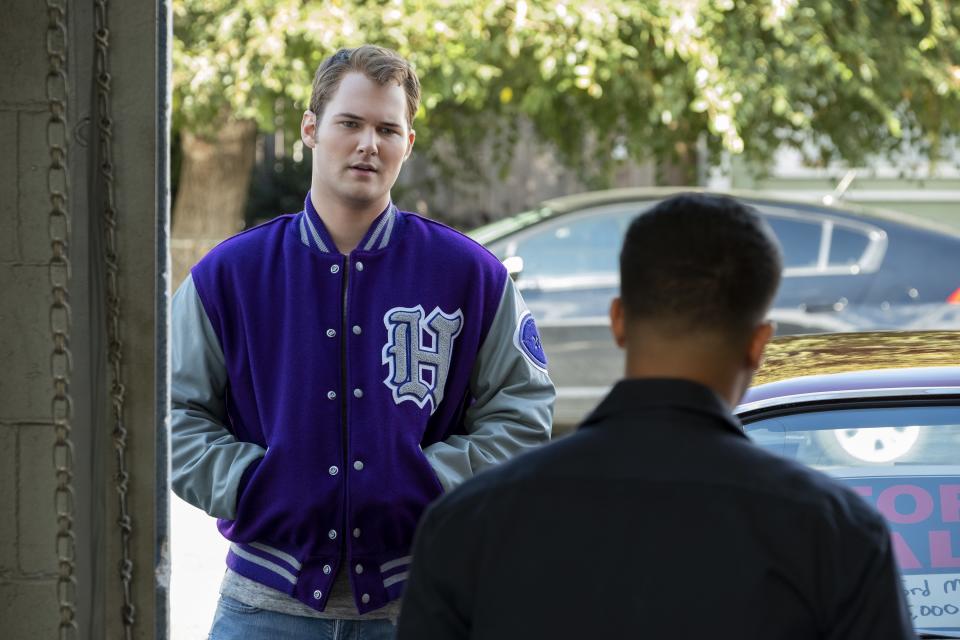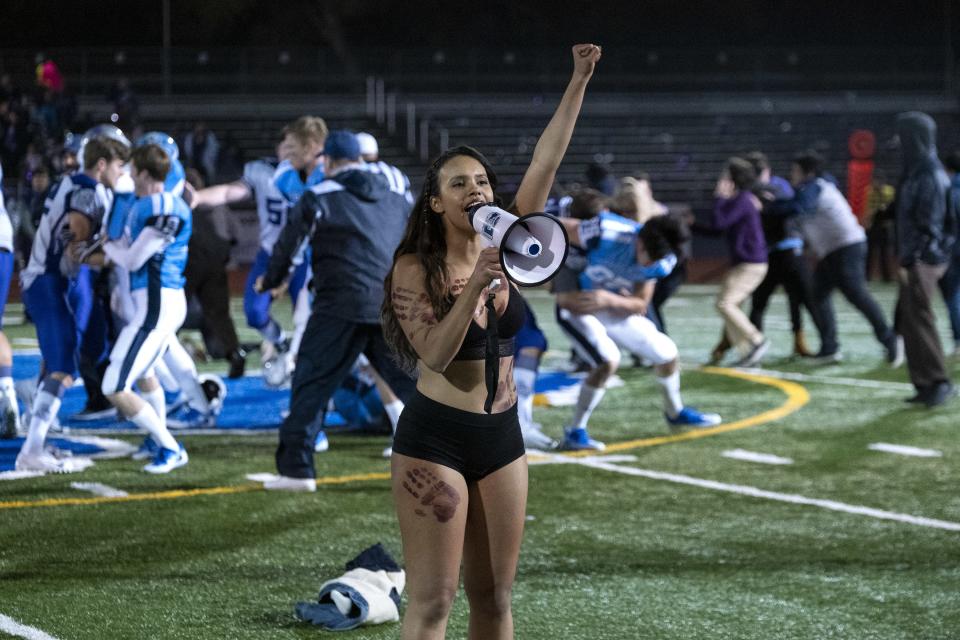Alisha Boe Says ‘You’re Supposed to Be Mad and Confused’ by 13 Reasons Why
13 Reasons Why is, without a doubt, one of the most controversial shows on Netflix. Based on Jay Asher's best-selling novel, the series quickly garnered criticism after its March 2017 premiere for the graphic—and, for many, triggering—depictions of suicide and sexual assault. Netflix has attempted to do right since season one by offering trigger warnings before each episode, though the content itself hasn't changed. 13 Reasons Why is still tackling those difficult topics—with nuance, sure, but also in harrowing detail. (Consider this your spoiler warning.)
This rings especially true for the character Jessica Davis, played by Alisha Boe. Jessica started off 13 Reasons Why a popular, carefree cheerleader; after she's sexually assaulted by Bryce Walker (Justin Prentice), who also raped Hannah Baker (Katherine Langford), she struggles with the emotional trauma. As the show has progressed, we've seen how Jessica has handled the aftermath of her assault. It's a difficult journey, but by season three she's found a new purpose: She becomes class president, forms a survivors support group at Liberty High School, and aims to end the campus's toxic jock culture—at any cost.
In tandem with this story is further exploration into Bryce Walker's psyche. In many ways, 13 Reasons Why humanizes him in season three, offering glimpses into his family life that might explain his deplorable actions. As you may know from the show's promos, Bryce is murdered in season three, and the "Whodunit?" narrative occupies a large chunk of screen time. But more complex than that is the dynamic between him and Jessica. Here, Alisha Boe opens up about that, her character's journey, what she thinks about Bryce's depiction in season three, and more.
Glamour: Jessica has quite the arc this season. What did you first think when you saw where she was going?
Alisha Boe: I was very excited. I really thought it was the natural progression of things. Jessica's had such journey since the first season. In the second season, you really see her work through her PTSD; at the end of it, you see her grow from a victim to a survivor. So I was really looking forward to seeing what the writers had come up with, storylines for Jessica in the third season, and her coming into her own power. It was just such a compelling and realistic journey for her. It was the most fun I've ever had being able to play her, for sure.
What did you do, specifically, to prepare for it?
I drew a lot of inspiration from the internet, because we are overflowing with powerful women who aren't afraid to speak out. There are so many YouTube videos of women way smarter than me that are speaking their truth and making inspirational speeches. Aside from that, just listening to what Jessica has to say and what she's gone through set me up for this season to be able to tap into where she's coming from.
Was the current climate, with #MeToo and Time's Up, on your mind this season as you were playing Jessica?
Yeah, I think it's absolutely inevitable. It has to be. It's interesting because during the second season, we were filming the court scene where Jessica finally goes against her abuser. I think a week before we filmed it is when Ronan Farrow released that article [in The New Yorker about Harvey Weinstein]. Every single day, I would wake up and see new articles. Another news article, a headline of another woman speaking up against her attacker. I remember going in on that day to film that scene, and I felt very empowered. It just rings true to the following season. More and more, we're given collectively, as women, a platform because people are listening. Because we aren't afraid to speak. Because of the woman who came before us who spoke out. They opened all these endless doors. As a woman, it's on your mind every single day.

3
One thing that stuck out as I was watching this season is that all the characters are given full complexity, even Bryce, Jessica's rapist. There are scenes where he's painted in an almost empathetic light. What did you make of that?
It's jarring to see because the last two seasons we've only seen him through the perspective of Jessica, Clay, or through the perspective of his actions. We never really got to know his home life or his family. It's interesting because even the most evil people are—we hate to admit it—human beings. That doesn't excuse any of their actions whatsoever, but I think the writers were trying to ask the tough question of, "What creates this type of monster?" You're not meant to feel sorry for him. I didn't feel sorry for him at all. You just get more layers to the story. You get to see his home life and his dad and his grandpa and the toxic masculinity that lives within his family.
Of course, with controversial storylines will come criticism on Twitter. I did see that some people are upset Bryce was getting humanized on the show. What would you say to those critics?
I wouldn't necessarily say anything because they're free to feel however they want to. I would be upset too. You're just seeing layers of his story and why he is the way he is. It does not excuse any of his actions whatsoever. It doesn't make it okay because we see a human side of him. At all. It's just painting a more complicated picture. I think you're supposed to be mad and confused.
What do you hope viewers take away from watching Jessica's journey this season?
I hope they feel empowered. I surely felt empowered playing and reading the words she had to say. I hope they realize they're not defined—no one is defined—by their trauma. They can be whoever they want to be. They can be as powerful as they want to be.
“Even the most evil people are—we hate to admit it—human beings. That doesn’t excuse any of their actions whatsoever, but I think the writers were trying to ask the tough question of, ‘What creates this type of monster?’”
Jessica and the sexual assault survivors association at Liberty High School try their hand at activism this season to complicated results. What do you think is important for people to learn from them?
Jessica's activism journey this year is never a straight line. She's constantly trying to find the right way to get her message across. When you're doing something or attempting something for the first time, you're not going to do it perfectly. As long as you are coming from a good place and you try to learn and you really are trying to spread a good message, be as loud as you want to be. Be as powerful as you want to be. Don't be afraid of failures, as long as you get back up and try again.
For sexual assault survivors who are watching the show: What do you hope they feel from seeing this character portrayed on screen?
I can only judge from the messages that I've seen sporadically. I can't speak to all of them. Everyone's going to have a different opinion on it. Some people may think that it rings true to their experience and are glad to see it reflected on the screen, and some may not agree. At the end of the day, I just hope it was authentic.

3
NetflixThere's a PSA at the beginning of the season warning viewers that maybe the show isn't for them if they might feel triggered or upset. How have you dealt with the criticism the show's received over the years for its depictions of suicide and rape?
I think it comes with the territory. It's very controversial topics that we are covering, and everybody has the right to their own opinions. I honestly welcome any criticisms because I feel like they're all valid. If they feel triggered, or if they feel any sort of way, it's valid. They're completely valid to have those opinions. I just hope people know we are coming from a good, loving place.
This interview has been edited and condensed.
Christopher Rosa is the staff entertainment writer at Glamour. Follow him on Twitter @chrisrosa92.
Originally Appeared on Glamour

